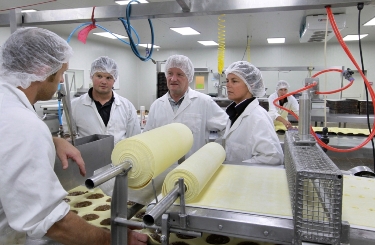Sky's the limit for pie maker
Article Index
 When Phil Pollett and his father bought the Goodtime bakery business in 1978 they were making $30k a year- today the company has annual revenues of over $10 million. Without a doubt they’ve got there because the pies taste great however Phil attributes much of the success to a focus on getting the processes right. Not surprising then, that as the business enters a new phase of growth, Goodtime has signed up to the High Performance Work programme, an initiative Phil insists other like-minded businesses would be crazy not to do.
When Phil Pollett and his father bought the Goodtime bakery business in 1978 they were making $30k a year- today the company has annual revenues of over $10 million. Without a doubt they’ve got there because the pies taste great however Phil attributes much of the success to a focus on getting the processes right. Not surprising then, that as the business enters a new phase of growth, Goodtime has signed up to the High Performance Work programme, an initiative Phil insists other like-minded businesses would be crazy not to do.
Overseeing the state of the art renovations and expansion at the Goodtime Food Company’s Onekawa bakery have absorbed a good deal of managing director’s Phil Pollett’s time over the last six months. To many, signing up to a programme to increase a company’s productivity might have been put on the back burner at such a busy time – but not so at Goodtime.
A process engineer by trade, Phil has long upheld the importance of good processes to a successful business.
“We need High Performance Work because it’s helping us to continually improve our processes; it really is an exceptionally good programme because compared to other programmes, it’s so hands on.”
“I don’t know of any other programmes that are this hands-on.”
Trevor Hall from business improvement specialists Smarter Better Faster will be working, one on one, with Goodtime’s staff for, at least, the next 12 months.
The course has kicked off with leadership programmes in the bakery; “developing a leadership chain of command” Trevor says.
Team leaders now have targets to meet and tool box meetings every day are followed by briefing production staff on the previous day’s performance. The team leaders are given profit and loss breakdowns each week with targets aimed at reducing downtime and waste.
Product changeover is taking five minutes, not the normal fifteen minutes and staff understand they need to shift to other jobs during a breakdown, to avoid total loss of production during downtime.
“We knew downtime was costing us money but we didn’t know exactly how much, now we can attach a dollar value,” Phil says.
“With the changes that we have made at the plant, together with the changes made through HPW, we would expect to be increasing production by as much as 50 per cent more, with the same amount of staff.”
Lil Kinder is Goodtime’s bakery manager. She’s been with the company for ten years and welcomes the shift from old school practices to a more rewarding way to work, which means a lot more time behind a calculator and less time feeling “bossy.”
“The team leaders now understand the value of everything they do including the cost of downtime and so they are much more organised,” Lil says.
“It’s really good for them, they feel stoked to come to me at the end of the day and say ‘Lil we did this many pallets today’ and they are proud of their results”.
Phil says the staff are finally moving away from “the good old Kiwi attitude of trying to do everything yourself” or managing by reaction.
“We still have some managers stamp licking but that’s going to change.”
Ensuring the bakery is operating as efficiently as possible is crucial because with a new pie-making machinery business in its early stages and already generating sales in the US, Phil won’t be on site as much as he is now.
“I really need staff to run the plant from a managerial point of view - I can’t be everywhere.”
Reducing production waste is the next step on the HPW programme and it will need to be a sustainable approach, if Goodtime are to continue to lift productivity, in the long term.
Currently around two hundred kilos of product is wasted on a weekly basis and Phil admits it gets worse at times. And it’s not just pastry.
“Through poor stock rotation, we can lose kilos of expensive chicken or steak fillings.”
Success will come down to the team leaders training their staff more efficiently, rather than resorting to reactive management
As chairman of Food Hawke’s Bay, Phil says other companies, with growth as their focus, should join High Performance Work.
“It’s money on the bottom line; the problem with Kiwis is that they don’t like people criticising their own systems.
“Companies that want to grow, need to do use HPW – they’d be crazy not to.”

